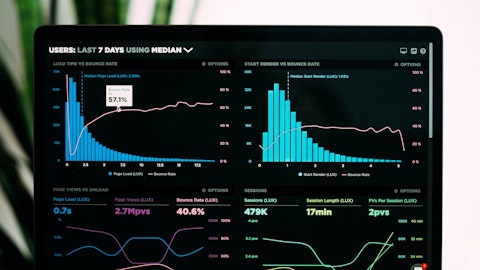In this piece, we will take a look at the 10 best big data stocks to buy now.
The global big data market is on a rapid growth trajectory, projected to reach $103 billion by 2027, more than doubling its size from 2018. This explosive growth is driven by the increasing reliance on data to inform business decisions, optimize operations, and unlock new revenue streams. According to Statista, the software segment, in particular, is poised to dominate, accounting for 45% of the market by 2027. Big data, characterized by its massive volume, high velocity, and wide variety, presents both opportunities and challenges. Traditional data processing tools struggle to handle the scale and complexity of modern data sets, which have been expanding rapidly due to the surge in mobile data traffic, cloud computing, and the integration of technologies like artificial intelligence (AI) and the Internet of Things (IoT). These factors have contributed to the rise of big data as a critical asset for businesses across industries. As the data landscape evolves, advanced analytics tools such as predictive analytics and data mining have become essential for extracting valuable insights from vast datasets.
The rise of the Internet of Things (IoT) has led to a surge in connected devices, generating enormous amounts of data that necessitate advanced big data solutions for effective processing and analysis. Cloud computing enhances the big data market by offering scalable and cost-efficient storage and processing capabilities, enabling businesses to handle large data volumes with ease. Technological advancements in big data are continually enhancing the management and analysis of vast datasets, making these processes more accessible and practical. This progress supports the growing trend of data-driven decision-making, where companies increasingly rely on data insights to make informed choices, optimize operations, and secure a competitive edge. Additionally, big data analytics helps organizations uncover hidden patterns and customer trends, fostering innovation and allowing for the development of products and services that adapt to evolving market demands, underscoring the vital role of big data in today’s competitive landscape.
Investment in big data technologies is also driven by stringent data privacy and security regulations. Compliance with laws like the General Data Protection Regulation (GDPR) in Europe and the California Consumer Privacy Act (CCPA) in the U.S. is becoming mandatory for businesses. These regulations require robust data handling practices, pushing companies to implement advanced big data solutions that ensure data privacy and security. Enhanced measures such as secure storage and data privacy protocols build trust with consumers and stakeholders. Moreover, the need for effective data governance frameworks is accelerating the adoption of sophisticated big data technologies. These solutions facilitate comprehensive data management, including tracking data lineage, maintaining data integrity, and conducting regular audits. Emphasis is placed on integrating encryption, anonymization, and real-time monitoring tools to prevent data breaches and unauthorized access. Continuous investment in big data technologies is crucial for businesses to meet evolving compliance requirements, thereby driving the market’s growth.
According to a report by Verified Market Reserach, North America is projected to remain a leader in the big data market, driven by key industries such as finance, healthcare, and e-commerce. In the financial sector, Big Data analytics plays a crucial role for banks, investment firms, and insurance companies by providing deeper insights into customer behavior, detecting fraudulent activities, and evaluating risk. By analyzing extensive data sets, including transaction histories, market trends, and customer demographics, financial institutions can uncover patterns and anomalies that aid in making informed decisions and managing risks. Predictive analytics models further enhance market trend forecasts, optimize investment strategies, and improve portfolio management, contributing to greater profitability and competitive edge in the financial sector.
In healthcare, Big Data analytics significantly improves patient care, reduces costs, and advances medical research. Healthcare providers use Big Data to analyze electronic health records (EHRs), medical imaging, and genomic data to tailor treatment plans, diagnose diseases with greater precision, and predict patient outcomes. Population health analytics also helps healthcare organizations identify high-risk groups, allocate resources more effectively, and implement preventive measures. Additionally, the integration of big data into healthcare systems supports real-time monitoring of patient health metrics, allowing for timely interventions and better overall outcomes. Pharmaceutical companies benefit from big data by accelerating drug discovery, refining clinical trials, and creating personalized medicines, driving innovation and progress in medical science.
With such a robust outlook for the big data market, investors are keenly eyeing companies that are well-positioned to capitalize on this trend. In this article, we will explore the best big data stocks to buy now, focusing on companies that are well-positioned to capitalize on the immense growth opportunities within this dynamic sector.

An executive presenting a business proposal in a modern open office space, surrounded by data analytics displays.
Our Methodology
We used big data ETFs plus online rankings to compile an initial list of the best big data stocks to buy now. We narrowed our list to the 10 stocks that analysts see the most upside to. The list is sorted in ascending order of analysts’ average upside potential, as of August 17. Note: We only included companies whose primary business is in the big data industry.
At Insider Monkey we are obsessed with the stocks that hedge funds pile into. The reason is simple: our research has shown that we can outperform the market by imitating the top stock picks of the best hedge funds. Our quarterly newsletter’s strategy selects 14 small-cap and large-cap stocks every quarter and has returned 275% since May 2014, beating its benchmark by 150 percentage points (see more details here).
10. NVIDIA Corporation (NASDAQ:NVDA)
Average Analyst Share Price Target Upside: 5.40%
Average Analyst Share Price Target: $131.31
Number ten on our list of ten best big data stocks to buy now is NVIDIA Corporation (NASDAQ:NVDA). The company makes chips that are used to facilitate big data use cases. The average analyst price target for NVIDIA Corporation (NASDAQ:NVDA) is $131.31, indicating a potential upside of 5.40% as of August 16. Analysts consider NVIDIA Corporation (NASDAQ:NVDA) a strong buy ahead of its August 28 earnings report. Despite a 35% drop, the stock rebounded and may surge again. NVIDIA Corporation (NASDAQ:NVDA), a leader in the AI market, stands to benefit from the sector’s rapid growth, projected to expand from $184 billion in 2024 to $826 billion by 2030. Analysts believe the company’s current 78% gross margin may decline due to competition, but this isn’t an immediate concern. With a forward P/E ratio of around 40 for fiscal 2025, NVIDIA Corporation (NASDAQ:NVDA) continued earnings growth could drive its stock higher, making it a solid long-term buy despite potential risks.
Patient Capital Opportunity Equity Strategy stated the following regarding NVIDIA Corporation (NASDAQ:NVDA) in its Q2 2024 investor letter:
“NVIDIA Corporation (NASDAQ:NVDA) continued to lead both the market and the portfolio, remaining a top performer in the period gaining 36.7%. Nvidia is the market leader in designing and selling Graphics Processing Units (GPU), which has recently benefited from the insatiable demand of artificial intelligence (AI) models. The company currently captures 92% market share of data center GPUs and grew revenue, earnings and free cash flow (“FCF”) an astounding 126%, 392%, and 610%, respectively, over the last year. While we expect competition to increase, we think NVDA can continue to maintain top market share. While many are concerned with backlog times shortening, we think the rollout of the B100, which promises 2.5x better performance for only 25% more cost, later this year will create more shortages. With leading edge technology, an increasing innovation cycle and strong cash generation, the company is well positioned for the increased adoption of artificial intelligence (AI).”
09. Oracle Corporation (NYSE:ORCL)
Average Analyst Share Price Target Upside: 6.11%
Average Analyst Share Price Target: $145.83
The average analyst price target for Oracle Corporation (NYSE:ORCL) is $145.83, representing a potential upside of 6.11%. Oracle Corporation (NYSE:ORCL) is well-positioned in the AI revolution, providing cloud, database, and enterprise software solutions to 98% of Fortune 500 companies. This strong IT foundation has driven growth, with Q4 fiscal 2024 revenue rising 3% year over year to $14.3 billion, and operating income up 15%. Oracle Corporation (NYSE:ORCL) secured over 30 AI-related contracts worth $12 billion, boosting its remaining performance obligation (RPO) to $98 billion, a 44% increase, signaling accelerating sales growth. Oracle’s extensive experience in cloud and AI is attracting new and existing clients eager to leverage AI for productivity gains. Analysts expect Oracle Corporation (NYSE:ORCL) to generate $57.9 billion in revenue in fiscal 2025, with the potential to reach a $1 trillion market cap by 2034 if it maintains 11% sales growth, or by 2032 if growth accelerates to 15%. With AI adoption estimates rising, Oracle Corporation (NYSE:ORCL) could achieve this milestone sooner than expected.
ClearBridge Value Equity Strategy stated the following regarding Oracle Corporation (NYSE:ORCL) in its Q2 2024 investor letter:
“Likewise, cloud computing software company Oracle Corporation (NYSE:ORCL) reported strong backlog growth and signed a new client in OpenAI, which intends to use Oracle’s cloud infrastructure to train its AI models. The company also received tailwinds from its announced partnership with Google’s Cloud Platform (GCP) to build Oracle’s cloud infrastructure directly into GCP, which we believe will help accelerate the growth of Oracle’s cloud database services.”
08. Accenture plc (NYSE:ACN)
Average Analyst Share Price Target Upside: 7.62%
Average Analyst Share Price Target: $351.82
The average analyst price target for Accenture plc (NYSE: ACN) is $351.82, reflecting a potential upside of 7.62%. On August 2, Accenture plc (NYSE:ACN) enhanced its infrastructure and net-zero project management capabilities by acquiring BOSLAN, a Spanish engineering firm specializing in renewable energy projects. This acquisition adds over a thousand professionals, mainly from Spain and Brazil, to Accenture plc (NYSE:ACN) Industry X division, strengthening its ability to deliver AI-driven net-zero infrastructure solutions. The move aligns with the rising clean-energy transition spending in Europe, which reached $341 billion in 2023. BOSLAN’s expertise is expected to bolster Accenture plc (NYSE:ACN) global infrastructure services and support clients’ net-zero goals. This acquisition is part of Accenture’s broader strategy to expand its offerings in AI and large-scale capital projects. Accenture plc (NYSE:ACN) also reported strong Q3 fiscal 2024 results, with $16.5 billion in revenue and an improved operating margin of 16.4%. The company projects Q4 revenue growth of 2% to 6% in local currency.
Polen Focus Growth Strategy stated the following regarding Accenture plc (NYSE:ACN) in its Q2 2024 investor letter:
“Autodesk and Accenture plc (NYSE:ACN) were also notable absolute detractors in the quarter. For Accenture, the past year has proven to be a weak backdrop for the IT services industry as enterprises rationalize their IT budgets and defer spending on discretionary, shorter-cycle deals. Accenture has not been immune to this broader weakness, as evidenced by slowing growth in recent quarters. However, we would note that later in the quarter, the stock responded very positively to results that showcased AI bookings growing rapidly, though still a small portion of overall bookings. Additionally, as we head into 2025, growth comparisons should ease considerably.”





